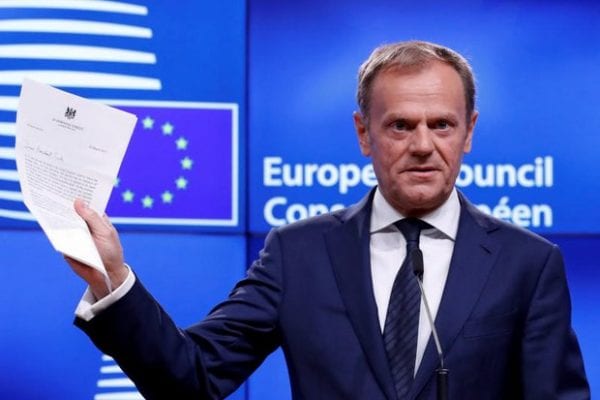
Image Credit: The Bangkok Post
Phil Syrpis, University of Bristol
In the aftermath of the crushing defeat of the government’s Brexit plan in the House of Commons, the question on everyone’s lips is “what next?” Opinion is divided: some say the UK is now heading for “no deal”, others for “no Brexit”.
If nothing is agreed, current UK law means the UK will leave the EU without a deal on March 29 – two years after the prime minister, Theresa May, triggered article 50, the article of the EU treaty which governs a state’s withdrawal. If the UK takes the decision to revoke article 50 the UK remains within the bloc with all its rights under EU law intact.
But both major parties insist that it is still possible to conjure up a new Brexit deal. As time is now very short, debate is turning to extending article 50, deferring the date on which the UK leaves the EU.
Under domestic law, extending article 50 would require changes to the March 29 exit date set in the EU Withdrawal Act. As a matter of EU law, the text of article 50 states that the UK cannot unilaterally extend the two-year negotiation period. Nor can it “demand” an extension. It can only “ask for” one. The request would then be considered by the European Council, and an extension would only be granted with the unanimous agreement of the remaining 27 member states, the EU-27. In principle, the extension could be short or long. There is no legal bar to the article 50 period being extended more than once.
That is the law. The rest is politics – and so, inevitably in these volatile times, rather speculative. But it is – and this is a lesson which many have yet to learn – important to be alert to EU politics, as well as goings on in Westminster.
The type of request matters
Any extension requires the unanimous agreement of the EU-27. On the EU side the messaging has been clear: the EU will consider an extension request in the light of its strategic interests. All member states will need to be persuaded that they will benefit from granting the UK extra time. And there are practical – but not insurmountable – difficulties with any extension which runs beyond the start of July, when the new European Parliament is first scheduled to sit after May elections. Guy Verhofstadt, the EU parliament’s chief Brexit representative, for example, tweeted that it would be “unthinkable” that “article 50 is prolonged beyond the European elections”.
What we will not let happen, deal or no deal, is that the mess in British politics is again imported into European politics. While we understand the UK could need more time, for us it is unthinkable that article 50 is prolonged beyond the European Elections. #Brexit #EPlenary
— Guy Verhofstadt (@guyverhofstadt) January 16, 2019
This means that a lot depends on the nature of the UK’s request. If the extension is to allow time for a new Brexit deal, the EU will want assurances that the new deal commands the support of the UK parliament. So the UK could not obtain an extension now. It could only do so once it could demonstrate to the EU that there is majority House of Commons support for a new approach – and once the EU had been able to ascertain that the new approach was viable from its perspective.
I welcome the signs that there will now be cross-party attempts to find a new deal, for example along the lines of a “Norway-plus” model. But I see few grounds to be optimistic that a better Brexit deal, which commands majority support, can suddenly be found.
From the EU’s perspective, changes to the non-binding political declaration for the future EU-UK relationship are much more likely to be accepted than changes to the withdrawal agreement itself, which EU officials insist has been locked down.
Any attempt to reopen the withdrawal agreement, with the aim to find a new approach to the controversial issue of the Irish border, will very likely be rejected out of hand. In any event, for an extension on the basis of a new deal to be granted, UK politics would have to move uncharacteristically quickly and decisively in the days and weeks ahead.
In the EU’s hands
There are a host of other reasons for which an extension might be sought. In each case, the EU will evaluate the attractiveness of the UK’s request and decide whether the extension should be granted.

A short extension may be sought to enable UK legislation to be passed to prepare for Brexit, whether on the basis of a new deal or no deal.
A longer extension would be needed for a second referendum. Given the complexities involved, any such extension would likely have implications for the European parliamentary elections. But, in the light of the government’s defeat and the ongoing divisions within parliament, a second referendum surely looks less likely – it is not easy to see that there is a “leave” option for another referendum ballot that enough MPs will agree to.
A longer extension again would be needed for a general election – though perhaps not as long as a second referendum. Given the timescale, the inherent uncertainty about the outcome and the lack of clarity about the main parties’ position, the EU would be very unlikely to accept an extension on that basis.
So, while an extension is possible, it is the EU’s to grant. To obtain an extension the UK will have to look beyond Westminster and appeal to the EU’s interests.![]()
Phil Syrpis, Professor of EU Law, University of Bristol
This article is republished from The Conversation under a Creative Commons license. Read the original article.
